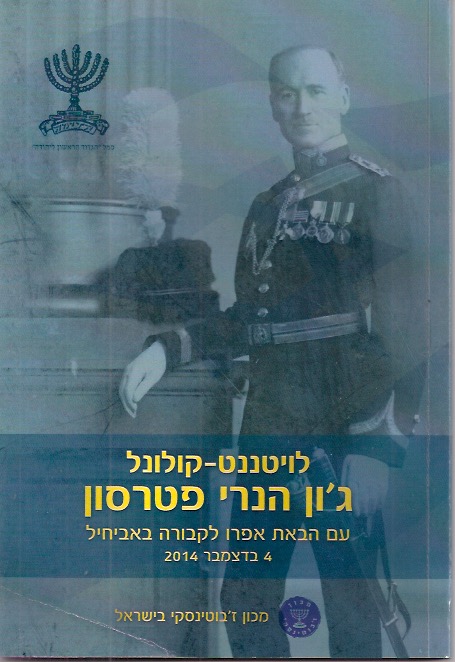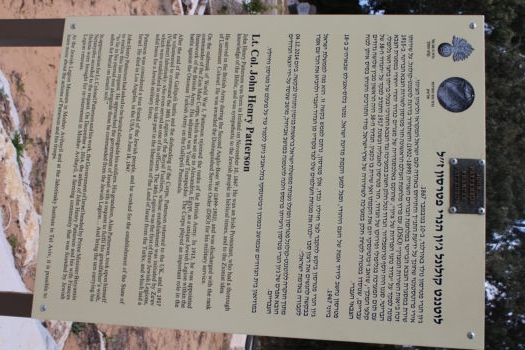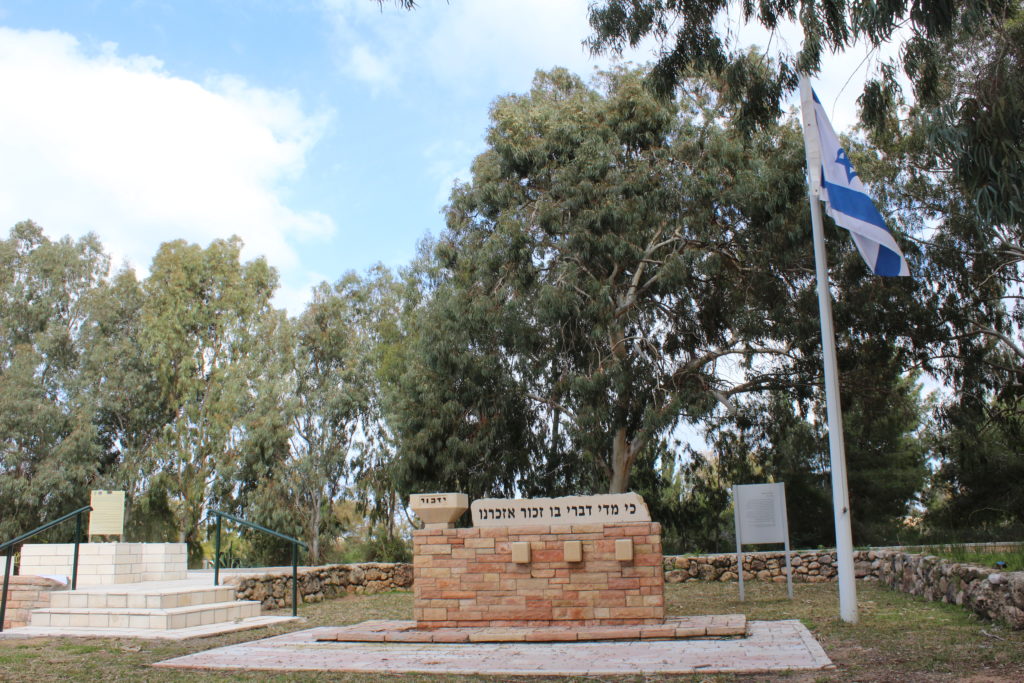British-Irish colonel John Henry and Frances Patterson finally granted wish: burial in Israel near soldiers he led

John Henry and Frances Patterson’s new gravesite (on left) in Israel. The inscription on the monument (right) reads, from Jeremiah 31:19, “As I speak of him, I will remember him.” (Hillel Kuttler)
MOSHAV AVICHAIL, Israel (JTA) – On a crisp February morning in this community near the Mediterranean Sea, the sound of Israel’s flag whipping in the wind likely pleased the soul of John Henry Patterson, whose ashes were buried a few yards away.
Patterson was a lieutenant colonel in the British military, and during World War I he commanded the Zion Mule Corps and the Jewish Legion — the first Jewish military units in two millennia.
Although he was Christian, Patterson had expressed an interest in being buried in Israel alongside the men, many from pre-state Israel, he had commanded. Patterson had been reared on the Bible and a love for the Jewish people and their land. But his family could not afford to transport the remains to Israel when he died 67 years ago in Los Angeles.

This pamphlet was published for the Dec. 4, 2014, ceremony for the reburial of the remains of Lt.-Col. John Henry Patterson and his wife, Frances, on a moshav in Israel established by Patterson’s soldiers. (Hillel Kuttler)
In December, his wishes were finally honored: his remains and those of his wife, Frances, were moved to the cemetery at Avichail, a moshav founded by many of his soldiers.
The ceremony marking the transfer of the remains culminated several years of effort by a diverse cast of characters, among them Jerry Klinger, a history enthusiast from Washington, D.C.; Myrna Strapp, a civil litigator in Los Angeles recruited last year after several lawyers declined requests to handle the filings required to facilitate the transfer; Karen Washington, an African-American woman who works at the Los Angeles cemetery where Patterson’s remains were interred originally; and Israeli Prime Minister Benjamin Netanyahu, who spoke at the grave-site and at the nearby Jewish Legion Museum and has personal ties to Patterson.
The reburial occurred just shy of the March 22 centennial of the British War Office’s appointing Patterson to lead the Zion Mule Corps, which would fight in Gallipoli, Turkey. The corps was disbanded in 1916, but later reconstituted as the Jewish Legion (also called the 38th Royal Fusiliers), with Patterson in command through 1918.
“The whole issue of the Jewish Legion is something that’s not so well known,” Yossi Ahimeir, director-general of the Jabotinsky Institute, said in an interview in his Tel Aviv office. “This is the year that we should connect Patterson and the Jewish Legion – and should [educate Israelis] that not all non-Jews were against Israel. There were Brits who helped the Jewish nation, and Patterson stood out the most.”
The path leading to the ceremony proved rocky.
Strapp, representing Patterson’s grandson, Alan, had to overcome a local law that permits only the child of the deceased to authorize moving the remains. A judge ruled against her, but Strapp won on appeal last summer. She, Klinger and Chizki Sivak, a lawyer residing at Avichail who is married to the granddaughter of a Zion Mule Corps officer, also needed approvals from such agencies as the Los Angeles Department of Public Health and the Netanya-area rabbinate in Israel.
On Aug. 13, Klinger, Strapp and Sivak, along with Israeli consular officials and a Netanyahu aide, collected the urns at the Angelus-Rosedale Cemetery mausoleum. A shroud was placed over the urns. Psalm 23 was recited.
With that, “the colonel was under the protection of the Israeli government,” Klinger said.

The plaque at the site of John Henry and Frances Patterson’s new grave-site in Israel. (Hillel Kuttler)
Strapp, who took the case as her final one before retiring, couldn’t be in Israel for the reinterment because she was preparing to make aliyah later that month. But she watched the broadcast transmission of the ceremony, which included Netanyahu noting that his late father, Ben-Zion, worked in England and in the United States with the Zionist leader Vladimir Jabotinsky and Patterson to advocate for a Jewish army to fight the Nazis.
When Benjamin Netanyahu’s elder brother was born in 1946, Ben-Zion bestowed upon Patterson the honor of sandak, or godfather. The boy, Jonathan, was named for Patterson and for Jonathan’s grandfather, Nathan Mileikowsky. Jonathan “Yoni” Netanyahu would become a lieutenant colonel like his namesake, and was killed leading the Entebbe rescue operation in 1976.
Patterson “can be called the godfather of the Israeli army,” the prime minister told the assembled as he stood before a screen that read in English, “Lieutenant-Colonel Patterson: We Salute You.”
“In doing what we are doing today, we are repaying a great historical debt and a personal debt to a great friend of our people, a great champion of Zionism, and a great believer in the Jewish state and the Jewish people,” Netanyahu said.
In October, Strapp and her husband plan to welcome Washington, the Los Angeles cemetery official, who will be visiting Israel with her church group. As it turns out, the Strapps’ central Jerusalem apartment stands just two miles from Patterson Street, named for the man who first brought Christians and Jews together in 1915 and is doing so still.

Jewish Legion commander’s ashes brought to Israel
ReplyDeleteLt.-Col. John Henry Patterson, for whom Yoni Netanyahu was named, to be buried in Moshav Avihayil as per his dying wish 67 years ago
By MARISSA NEWMAN
12 October 2014, 4:36 pm 5
2K
shares
An LA mausoleum hands over the remains of Colonel-Lieutenant John Henry Patterson to Israeli representatives (photo credit: Orly HaLevy/Courtesy)
An LA mausoleum hands over the remains of Colonel-Lieutenant John Henry Patterson to Israeli representatives (photo credit: Orly HaLevy/Courtesy)
The commander of the Jewish Legion, Lieutenant-Colonel John Henry Patterson, who died in 1947, was exhumed and his ashes brought to Israel, in a fulfillment of the Christian Zionist’s final wish to be buried in the Holy Land, the Prime Minister’s Office announced Sunday.
“Patterson was one of the founders of the Jewish Legion, the first Jewish military force since the Bar Kochba revolt, and the basis for what would become the Israel Defense Forces,” Prime Minister Benjamin Netanyahu said in a statement.
Get The Times of Israel's Daily Edition by email and never miss our top stories FREE SIGN UP
Netanyahu said his parents, who were acquainted with Patterson, “spoke warmly” of the man “who worked with my father for the Zionist cause in the 1940s in the United States.”
The prime minister added that his late brother, Yoni Netanyahu, was named for Patterson, who was his godfather. Patterson gave Yoni Netanyahu a silver chalice, which “linked the commander of the renascent Jewish fighting force with one of Israel’s future military commanders,” he wrote.
John Henry Patterson (photo credit: Wikipedia)
John Henry Patterson (photo credit: Wikipedia)
Patterson will be reinterred along with his wife, Frances Helena, at the military cemetery in Moshav Avihayil, where many of his former Jewish Legion comrades are buried. The funeral was set to take place some time in November, while the nearby Jewish Legion Museum will hold a memorial service in his honor, which will be attended by the prime minister and president, representatives from the Israeli and British armies, relatives, and members of the moshav.
Patterson’s grandson turned to the Jabotinsky Institute a few years ago to ask that his grandfather’s last wish be respected. The request was later transferred to the Prime Minister’s Office, but the bureaucratic hurdles took some three years to surmount. Patterson’s remains were handed over to Israeli representatives at a Los Angeles mausoleum several weeks ago.
The Irish-born British soldier, author, and hunter oversaw two battalions of the Jewish Legion, the 38th Battalion and the Gallipoli Front, and commanded Zionist leaders Ze’ev Jabotinsky and Joseph Trumpeldor. Patterson later voiced support for the Jewish state, but died a year before it was established.
“As Prime Minister of Israel, I am privileged to honor Colonel Patterson’s wish that his final resting place be in the land of Israel next to the Jewish Legion soldiers he commanded,” Netanyahu wrote. “His return to Israel will do historic justice to the man about whom Ze’ev Jabotinsky wrote, ‘Never in Jewish history has there been in our midst a Christian friend of his understanding and devotion.'”
Lone Wolf: A Biography of Vladimir (Ze’ev) Jabotinsky by Shmuel Katz (577,000 words; 96 illustrations)
ReplyDeleteShmuel Katz’s detailed and comprehensive biography of Vladimir Jabotinsky (1880–1940) is an unabashedly partisan defense of one of the most complex Zionists of the early 20th century. Jabotinsky was a Russian poet, playwright, journalist, and novelist as well as the founder of Revisionist Zionism and of Betar. His oratory in many languages was legendary. Katz first heard him speak in South Africa in the early part of the 20th century and was so impressed that he dropped out of university to work for Revisionist Zionism.
Katz recounts Jabotinsky’s efforts to create the Jewish Legion during World War I, traces the history of Jewish relations with the British during the time of the Palestine Mandate, describes Jabotinsky’s role in the defense of the Jewish Yishuv and in organizing the Af-Al-Pi “illegal” Jewish immigration to Palestine before World War II. He paints a vivid mural of competing Jewish personalities, factions and ideologies in the decades before the establishment of Israel.
“Shmuel Katz has written an intelligent, journalistic account of Jabotinsky’s life […] and was able to use a substantial amount of previously unavailable material, particularly British archival documents. Although Katz clearly has tremendous respect and affection for Jabotinsky, he does not hesitate to criticize him, for example, for his ineffectiveness as a fundraiser [...] Lone Wolf’s greatest strength is its comprehensive breadth. Every major event and many minor incidents are extensively covered. Furthermore, Katz has taken the rather unorthodox move of including verbatim large sections of Jabotinsky’s original speeches and writings.” — Paul Radensky, H-Net
“[S]cholarly and yet totally gripping... we must be everlastingly grateful [...] to Shmuel Katz for so masterfully giving [Jabotinsky’s] memory fresh life... this [book] — quiet, calm, and, while certainly partisan, without a single shrill note — may one day help to direct the course of Israel’s seemingly endless argument with itself.” — Midge Decter, Commentary Magazine
“Dr. Katz's monumental and superb biography is a balanced, detailed story of a lion and not a wolf. (Ze'ev in Hebrew means a wolf and this is the reason why the title is Lone Wolf)” — Jewish Post
“Godfather of Israeli Army” Reburied in Israel After 68 Years
ReplyDeleteBy Ahuva Balofsky December 7, 2014 , 10:28 am
“And David went out; whithersoever Saul sent him, he had good success; and Saul set him over the men of war; and it was good in the sight of all the people, and also in the sight of Saul’s servants.” (1 Samuel 18:5)
image: https://www.breakingisraelnews.com/wp-content/uploads/2014/12/Patterson-660x330.jpg
Prime Minister Benjamin Netanyahu (R) and his wife Sara attend a state funeral of John Henry Patterson in Netanya on December 4, 2014. (Photo: Haim Zach/ Flash90)
In what Haaretz newspaper called a “modest but impressive ceremony” Thursday, John Henry Patterson, commander of the Jewish Brigade in the British army in World War I, was reburied in Israel. The man whom Israeli Prime Minister Benjamin Netanyahu called “the godfather of the Israeli army” had expressed a wish to be buried with his soldiers.
Patterson, born in 1867 in Ireland to a Protestant father and a Catholic mother, rose to fame in England after killing two man-eating lions during the construction of a bridge under his supervision in what is today Kenya. His exploits there inspired three movies. He later went on to command the Zion Mule Corps and the 38th Battalion of the Royal Fusiliers (also known as the Jewish Brigade) in World War I. There, he became enamoured with the idea of a Jewish State.
Zionist hero Ze’ev Jabotinsky, who co-founded the Jewish Brigade and fought alongside Patterson, said of him, “In all of Jewish history we have never had a Christian friend as understanding and devoted.”
Netanyahu shared his personal connection with Patterson, telling attendees that the man had been a personal friend of his father’s, Professor Benzion Netanyahu, and was godfather of his older brother, Yonatan, who was also named after the British soldier. Yoni Netanyahu fell in a rescue operation of Jewish hostages in Entebbe in 1976.
“[Patterson] had absolute confidence that the Jews would make remarkable soldiers – not adequate soldiers, but remarkable soldiers. And I think he had a lot to do with that. He began the reconstitution of the ability of the Jews to defend ourselves,” Netanyahu said. He also pointed out Patterson’s legacy as the first commander of a Jewish fighting force in 2,000 years, linking him to such heroes as King David and Bar Kochba.
Support Israel with a Virtual Blood Donation
Patterson’s remains were originally buried in California, where he lived out the final years of his life with his wife. He passed away in 1947, one year shy of seeing his dream of a Jewish state realized.
Patterson’s grandson, Alan, initiated the transfer of his grandfather’s remains after reading about him in the archives of the Jabotinsky Institute in Tel Aviv. The younger Patterson was surprised to discover the importance of his grandfather’s role in Israel’s history. In 2009, he came up with the idea of reburying his grandfather in Israel, in accordance with the wishes he had expressed.
Alan reached out to Yossi Ahimeir, head of the Jabotinsky Institute, who agreed to take the request to the Israeli government. Once the government was on board, a special delegation was sent to California to complete the legal process required. Patterson’s remains were re-interred Thursday at Moshav Avichayil near Netanya, a moshav (cooperative settlement) established by fighters from the Jewish Brigade in 1932.
“In bringing his ashes to Israel and laying them to rest here, beside the soldiers of the Jewish brigades that he established, we come full circle historically, and we repay a very great debt to one of the heroes of our people, one of the greatest supporters that Zionism, the Jewish people and the State of Israel ever had,” Netanyahu said at the ceremony. “We salute you, John Henry Patterson.”
With input from BBC News, The Independent, Haaretz and Israel HaYom
Belfast memorial to Irishman who supported Israel state damaged in hate crime
ReplyDeleteBelfast memorial to Irishman who supported Israel state damaged in hate crime
The damage caused to a mural of Lieutenant-Colonel John Henry Patterson on Northumberland Street. Picture by Declan Roughan
John Monaghan
09 June, 2016 20:39
RELATED STORIES
Graffiti on Milltown republican plot 'an outrageous act'
Unionists accused of 'overreacting' to 1916 memorial in Co Antrim
Belfast memorial to Irishman who supported Israel state damaged in hate crime
Mr Patterson was a firm advocate for the creation of an Israeli state. Picture by Declan Roughan
A MURAL of an Irishman who advocated the creation of an Israeli state has been damaged in an attack which is being treated as a hate crime by police.
Police said that at around 1.30am on Thursday, two containers were set alight close to the memorial to Lieutenant-Colonel John Henry Patterson at the junction of Beverley Street and Northumberland Street, off the Shankill Road.
Born in 1867 in Westmeath, to a Protestant father and a Catholic mother, Mr Patterson joined the British Army and gained notoriety for shooting man-eating lions responsible for killing construction workers building a railway between Kenya and Uganda.
In the First World War, he commanded a volunteer force known as the Jewish Legion and later became a committed supporter of the creation of a Jewish state.
Mr Patterson became a close friend of Benzion Netanyahu, the father of the current Israeli Prime Minister Benjamin, during campaigning for Israel in New York.
A large star of David is written on the memorial with words from Mr Netanyahu: "In all of Jewish history we have never had a Christian friend as understanding and devoted."
Mr Netanyahu has previously described the Irishman as the "godfather of the Israeli army".
The Israeli Prime Minister said: "[Patterson] had absolute confidence that the Jews would make remarkable soldiers - not adequate soldiers, but remarkable soldiers. And I think he had a lot to do with that. He began the reconstitution of the ability of the Jews to defend ourselves."
Mr Patterson died in the US in 1947, a year before the state of Israel came into being.
His ashes, along with those of his wife Frances, were re-interred in Israel in 2014.
Police have appealed for anyone with information about the attack to contact officers on 101.